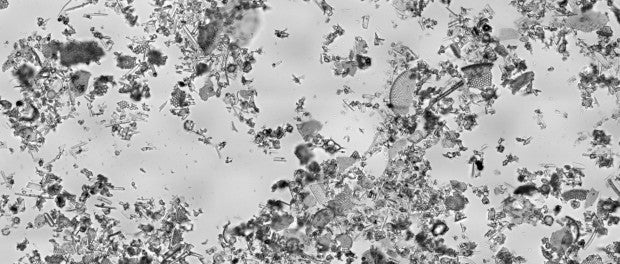Using Diatomaceous Earth Around the Farm

There are many difficulties we must face when farming and growing crops. These issues come at us in many ways, each often requiring their own type of remedy. One of the biggest problems we face is with pests. Whether it is fleas on your barn cat or bugs in the garden, there is simply no place for pests on the farm. Rather than purchasing various products to get pest problems under control, there is one option that has proven useful in the war on pests. That product is food grade Diatomaceous Earth, also known as DE.
Diatomaceous Earth exists as a result of the death of microscopic sea organisms known as diatoms which, upon dying, sink to the seafloor and fossilize, then becoming a part of the nutrients present on the seafloor. Diatoms are essentially a common type of algae, or phytoplankton, with cellular walls made of hydrated silicon dioxide, also known as silica. It is through the harvesting of these organisms that DE is produced.
So what good is a bunch of dead algae on the farm? Well, diatomaceous earth has properties that make it a successful ally against pests. Specifically, DE repels fleas, ticks, mites, spiders, ants, cockroaches, and other crawling insects that can be harmful to produce, pets, and people. The way it works is by penetrating the exoskeleton of pests and making their protective exterior useless. Pests are then dehydrated and their respiratory system can no longer function, resulting in death. All it takes is for a bug to come into contact with DE and the deed will be done; ingestion is not necessary for it to take effect.
There are several ways DE can be used around the farm, such as :
1. Treat mites or lice on chickens with DE by adding some to their dust bath. Since chickens are naturally inclined to dust bathe, they will do the work for you, although sprinkling some around the coop is helpful as well.
2. Repel flies with DE. Although it will kill flies in much the same manner as mentioned above, it is very typical of flies to avoid DE entirely, so sprinkle it in common manure areas where flies tend to congregate.
3. Clean up spills with DE. If your tractor is leaking fluids, sprinkle DE on the mess. The diatoms are porous and will quickly absorb any liquid present.
4. Protect crops from bugs through the use of DE. Dusting DE in the garden will help eradicate common garden pests such as aphids, ants, earwigs, slugs, and much more, saving crops in the process.
5. Treat working animals such as barn cats and cattle dogs with DE to control fleas and ticks. Apply to fur and work in to rid pets of pests. It can also be used to keep ticks off of you by dusting clothing.
When purchasing Diatomaceous Earth, be sure to always purchase it in food grade. Take care during application to minimize inhalation as it can irritate nasal passages and sometimes irritates skin as well. Be sure to read labels and follow all instructions prior to handling.
Diatomaceous Earth is just one more useful item to aid us in meeting the many demands present on the farm. Whether it is battling insects in the barn, in garden, on the animals, or even in the house, it is an easy go-to that enables you to restore comfort and reduce damage done by pests. It also keeps going where other insecticides fail as pests do not become immune to it over time. Diatomaceous earth is even said to have many human health benefits, about which you can learn more here, which make it seems as though adding DE to your farm is a win all around.









 Your Privacy Choices
Your Privacy Choices
Does this harm earthworms?
Diatomaceous Earth will not harm earthworms or honey bees.
Earthworm farmers use it to treat their beds for parasites and fungus. Worms are structurally different from insects… they can actually digest DE.
Bees will generally avoid it. If they do come in contact with it, they are covered with hair, and that keeps it off their bodies. It is not /desireable/ but it is not harmful either.
Well, I really doubt roach eggs can survive long time outside their hive, but I do agree clean the scene
immediately and thoroughly would be wise to help prevent
health issues. Traps caan also be used as it is helpfuul
in catching roaches by attracting them and then trapping them by adhesive.
The only catch is, youu may obtaun a property gecko infestation next.
Tip # three: Kelebihan air bisa lebih merusak anggrek
daripada kekurangan air.
These small insects can get into your house with food products,
laundry, crates, clothes, etc. There are lots of pest control organizations
which help get rid of roaches andd other unwanted insects.
They searched the property for any remnants of food or drink left behind.
Cockroaches – These very common bugs have been a nuisance foor a long time.
What you shouild be scared abou are the bacteria that these cockroaches harbor.
Using his magic pipe, the piper lured rrat pests out of
the town and over a cliff.
Hello
Thank you for usefull article regarding Diatomaceous earth, we also found it very important for human health. Please keep us updated with more usefull informations.
Best Regards
Mazyar
Can I spread under shavings in horse stalls and goat pens. Does it need to be food grade for that is it keep bugs and fly’s away.
That should be fine Terri. I would only worry about food grade if there is a chance they will eat it. The non-food grade stuff is fired and is like glass, so it can perforate the gut.